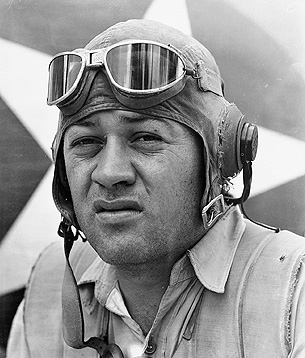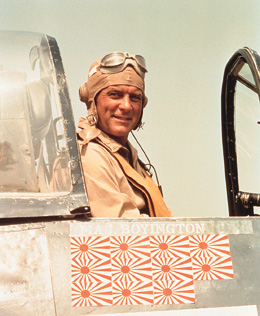Gregory Boyington, ’34, was UW’s ‘Black Sheep’ hero

Gregory “Pappy” Boyington
There aren’t many UW alumni who win the Medal of Honor, write a best-selling book and have Robert Conrad portray them in a TV series. In fact, there is only one: World War II Fighter Pilot Gregory “Pappy” Boyington, a 1934 engineering graduate who shot down 28 enemy planes as a Marine pilot.
Strangely enough, when he attended the UW, Boyington had a different name. Students in the early Thirties knew him a Greg Hallenbeck, a “short, solidly built aeronautical engineering major who was a member of the wrestling team,” according to one report. At that time he was using the name of his step-father and did not revert to his father’s last name until after graduation.
“His mother lived in Tacoma and worked as a switchboard operator to put him through college,” reports Pappy’s son, Gregory Boyington Jr. “My dad parked cars in some garage.” He also worked in an Idaho gold mine in the summer to pay his way through school and support his membership in the Lambda Chi Alpha fraternity.
Though an ROTC member, Boyington spent a year after graduation as a Boeing draftsman before he joined the Marines. He was a flight instructor for six years until he volunteered to be a “Flying Tiger” pilot in China prior to Pearl Harbor. Between his tour in China and Burma and later action in the South Pacific, Boyington shot down 28 planes-a World War II record for a Marine pilot.
But the day of his 28th kill was also the day he was shot down by a Japanese Zero fighter. Fished out of the water by an enemy sub, Boyington spent the next 20 months in prisoner of war camps, where he often suffered beatings and near starvation.
For some reason, the Japanese did not want Boyington’s whereabouts known to the Allies, so they never reported his capture. The Marines listed him as missing in action, but many thought he died in the crash. Through a fellow POW, he was able to send a code word to his mother that he was still alive. But for the rest of America, when his camp was liberated on August 28, 1945, the Medal of Honor winner seemed to come back from the dead.

Boyington briefs his “Black Sheep” pilots at an airfield in the New Hebrides. National Archives Photo.
Although his POW exploits make fascinating reading, Universal Studios was more interested in the rag-tag fighter squadron he created in the Pacific, officially known as VMF 214. In 1943, at the Espiritu Santo airfield in the New Hebrides, Boyington had a desk job handling the replacement pilots pool. When a call for a fresh fighter squadron from the States went unanswered, Boyington convinced his superiors to let him put together a unit from replacement flyers.
At first the makeshift squadron was a joke. “It was generally agreed at the fighter strip that we were going to make an awful mess of the deal,” Boyington later wrote. But in only 12 weeks of combat, the squadron destroyed 94 enemy fighters and made headlines in the States. As its leader, Boyington was a flamboyant commander, a darling of war reporters and a heavy drinker. According to one memoir, he would get raging drunk and try to wrestle other pilots-who were usually 10 or more years his junior. In fact, he got his nickname “Pappy” because he was so much older than the men he commanded.
As he neared the Marine record for kills, war reporters wouldn’t leave Boyington alone. Fred Avey, a squadron member, later told Aviation History, “They wanted him to break the record for downing Japanese planes. There were always four or five guys who wanted to interview him. I resented them because they should have let Boyington and us rest. They didn’t think about what it was like for us. Boyington was tired and at times shouldn’t have gone up, but he did. I wonder if that didn’t have something to do with his being shot down and captured.”
Though many squadron members wanted to name the group “Boyington’s Bastards,” the slightly more genteel “Black Sheep” squadron stuck instead. Banking on that name recognition, Boyington titled his 1958 memoir Baa Baa, Black Sheep. “He wrote every single word himself,” his son recalls. The book spent more than a year on the best-seller list and is still in print.

Robert Conrad played Boyington in the NBC TV series. Photofest photo.
Eighteen years later, when the movie/TV rights reverted back to Boyington, he sold them to Universal. The studio put TV veteran Robert Conrad in the role of squadron leader and named Boyington its “technical adviser.” Titled Baa Baa, Black Sheep , the NBC series debuted in 1976, but with competition from Happy Days and Charlie’s Angels, it only lasted two seasons. “It was a very expensive series to produce,” his son says, “but the reruns have been going on ever since.”
Some squadron veterans resented the series. “Television made it look like all we did was party, but that was in no way true,” Black Sheep veteran Fred Avey said in the Aviation History interview. “We never went up drunk. The only thing accurate about the show was that we flew Corsairs.” During a 1976 squadron reunion in Hawaii, “we all gave him hell for allowing them to do what they did,” Avey said. “Boyington realized how upset we were and apologized to us, and he was not one to apologize very often.”
There may have not been any drinking in the air, but Boyington did a lot on the ground. His addiction, he once wrote, was “no doubt the most damning thing in my character.” The problem grew worse during his post-war years. In his memoir, Once They Were Eagles, Black Sheep veteran Frank Walton wrote of that period, “Boyington went through a series of lurid, broken marriages and bounced from one job to another: beer salesman, stock salesman, jewelry salesman, wrestling referee. Liquor was always present.”
Alcoholics Anonymous helped, says his son, although Pappy never completely licked his addiction. His later years were plagued with ill health, including an operation for lung cancer. “He loved to go to air shows. He was in his 70s and was rather ill in his last years, but my stepmother used to say that when he went to air shows, it was the only time he was truly happy,” his son recalls.
He was also a life-long Huskies fan, his son reports. “One year you had a pretty good football team and I remember my dad saying, ‘If the Huskies go to the Rose Bowl, we’re going.’ But you never did make it that year.”
Boyington died on Jan. 11, 1988, and is buried in Arlington National Cemetery. In summing up his own life, he wrote at the end of his memoir, “If this story were to have a moral, then I would say, ‘Just name a hero and I’ll prove he’s a bum.’”